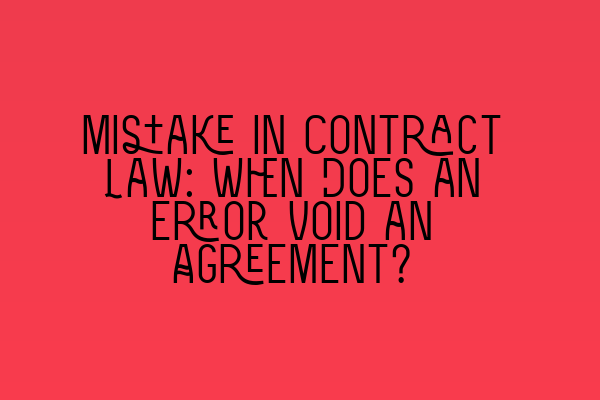Mistake in Contract Law: When Does an Error Void an Agreement?
In the world of contract law, mistakes happen. Whether it’s a simple typo or a major misunderstanding, errors in contracts can have significant consequences. Understanding when a mistake will void an agreement is crucial for all parties involved. In this article, we will explore the concept of mistake in contract law and discuss the circumstances under which an error can lead to the invalidation of a contract.
Before we delve into the specifics, it’s essential to clarify that not all mistakes will render a contract void. Courts generally recognize that parties to a contract are bound by their agreement, regardless of any mistakes made. However, there are exceptions to this general rule, and we will explore them in detail.
Types of Mistakes in Contracts
There are three main types of mistakes that can occur in contracts: unilateral mistake, mutual mistake, and common mistake.
1. Unilateral Mistake:
A unilateral mistake occurs when only one party to the contract is mistaken about a particular term or provision. In such cases, the general rule is that the mistaken party cannot back out of the contract merely because of the mistake. The reasoning behind this rule is that if a party could easily invalidate a contract due to a mistake, it would undermine the stability and predictability of contractual relationships.
However, there are exceptions to this rule. If the non-mistaken party knew or should have known about the mistake, or if the mistake was due to the other party’s misrepresentation, the mistaken party may be able to void the contract.
2. Mutual Mistake:
A mutual mistake occurs when both parties to the contract are mistaken about a fundamental aspect of the agreement. Unlike a unilateral mistake, a mutual mistake can render the contract voidable by either party. To qualify as a mutual mistake, the error must be significant enough to affect the core purpose of the contract. In such cases, the mistaken party can seek to have the contract rescinded or modified.
3. Common Mistake:
A common mistake, also known as a mistake as to the subject matter, arises when both parties hold the same mistaken belief about a crucial fact. For example, if both parties believe that a painting being sold is an original Picasso when, in fact, it is a replica, a common mistake exists. This type of mistake can also invalidate the contract as it demonstrates that the parties were not in agreement on a fundamental aspect of the transaction.
Remedies for Mistake
When a contract is deemed voidable due to a mistake, the court can offer several remedies depending on the circumstances. The most common options are:
1. Rescission:
Rescission involves returning the parties to their pre-contractual positions, effectively canceling the entire agreement. If the contract has been partially performed, the court may require restitution to restore the parties to their pre-contract state.
2. Rectification:
Rectification involves correcting the mistake by rewriting or modifying the contract to reflect the parties’ true intentions. This remedy is typically available when the error is a result of a typo or miscommunication.
Conclusion
In conclusion, while not all mistakes in contracts will invalidate an agreement, certain errors can lead to the voiding of a contract. Unilateral mistakes generally do not provide grounds to void a contract unless certain exceptions apply. On the other hand, mutual mistakes and common mistakes can render a contract voidable. It is crucial for parties involved in contract agreements to understand the different types of mistakes and their potential impact on the validity of a contract.
For more insights on contract law, be sure to check out these related articles:
1. Exploring the Impact of Frustration on Contractual Obligations: Legal Insights
2. Interpreting Contractual Clauses: Unlocking the Hidden Meanings
3. Legal Aspects of Business Contracts: Key Considerations for Entrepreneurs
4. Agreements in Contract Law: Understanding Its Various Types
5. Essentials of Consideration: Understanding the Basis of Contractual Exchange
Remember, a solid understanding of contract law is crucial to protecting your rights and ensuring fair and enforceable agreements. Make sure to consult with an experienced solicitor for personalized advice in specific contractual situations.
